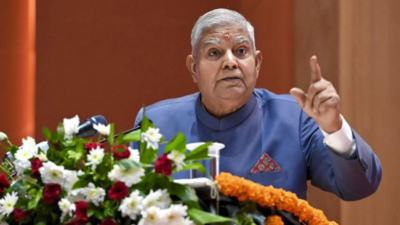
Vice President Jagdeep Dhankhar
NEW DELHI: Vice President
Jagdeep Dhankhar
on Friday questioned the involvement of the Chief Justice of India (CJI) in
executive appointments
, such as that of the CBI director, stating that it was time to "revisit" such norms. Speaking at the National Judicial Academy in Bhopal, he also raised concerns over the jurisprudential basis of the ‘doctrine of basic structure.’
“To stir your minds, how can in a country like ours or in any democracy, by statutory prescription, the Chief Justice of India participate in the selection of the CBI director?” Dhankhar said, according to PTI reported. “Can there be any legal rationale for it? I can appreciate that the statutory prescription took shape because the Executive of the day has yielded to a judicial verdict. But time has come to revisit. This surely does not merge with democracy. How can we involve the Chief Justice of India with any executive appointment!" he added.
The Vice President criticised what he termed as "executive governance by judicial decree," calling it a "constitutional paradox that the largest democracy on the planet cannot afford any longer." Dhankhar emphasised that all institutions must function within their constitutional boundaries.
“Governments are accountable to the legislature and periodically to the electorate. But if executive governance is arrogated or outsourced, enforceability of accountability will not be there,” he said. He added that any interference in governance by the legislature or judiciary was “antithetical to constitutionalism.”
Dhankhar acknowledged the importance of judicial review, stating, “Judicial review is a good thing as it ensures that laws conform to the Constitution.” However, he stressed that the ultimate authority to amend the Constitution rests with Parliament.
“The judiciary’s public presence must be primarily through judgments. Judgments speak for themselves… Any other mode of expression… undermines institutional dignity,” he remarked.
On the
basic structure doctrine
, which restricts Parliament from altering certain fundamental features of the Constitution, Dhankhar said its jurisprudential basis was “very debatable.” Citing a book by former Solicitor General Andhyarujina on the Kesavananda Bharati case, he noted, “Having read the book, my view is that the doctrine of the basic structure of the Constitution has a debatable, very debatable, jurisprudential basis.”
Concerns over Constitutional interpretation
Recalling his tenure as Parliamentary Affairs Minister in 1990, Dhankhar pointed out that the Supreme Court had only eight judges at the time, yet constitutional interpretation required a five-judge bench. “Please note, when this strength was eight, it (size of constitutional bench) was five. And the Constitution allows the highest court of the land to interpret the Constitution,” he said.
However, he warned against the misuse of constitutional interpretation. “Under the guise of interpretation, there can be no arrogation of authority, and the essence and spirit which the founding fathers had in mind under Article 145(3) must be respected,” he asserted.
Referring to the expansion of the Supreme Court, he stated, “If I analyze arithmetically, they were very sure the interpretation will be by a majority of judges, because the (total) strength then was eight. That five stands as it is. And the number (of total judges) is more than fourfold.”
Dhankhar also underscored the importance of free expression in a democracy. “If the right to express oneself is throttled or diluted, democracy gets thinner and thinner and thinner,” he remarked.
.png)
 German (DE)
German (DE)  English (US)
English (US)  Spanish (ES)
Spanish (ES)  French (FR)
French (FR)  Hindi (IN)
Hindi (IN)  Italian (IT)
Italian (IT)  Russian (RU)
Russian (RU)  1 week ago
10
1 week ago
10









Comments